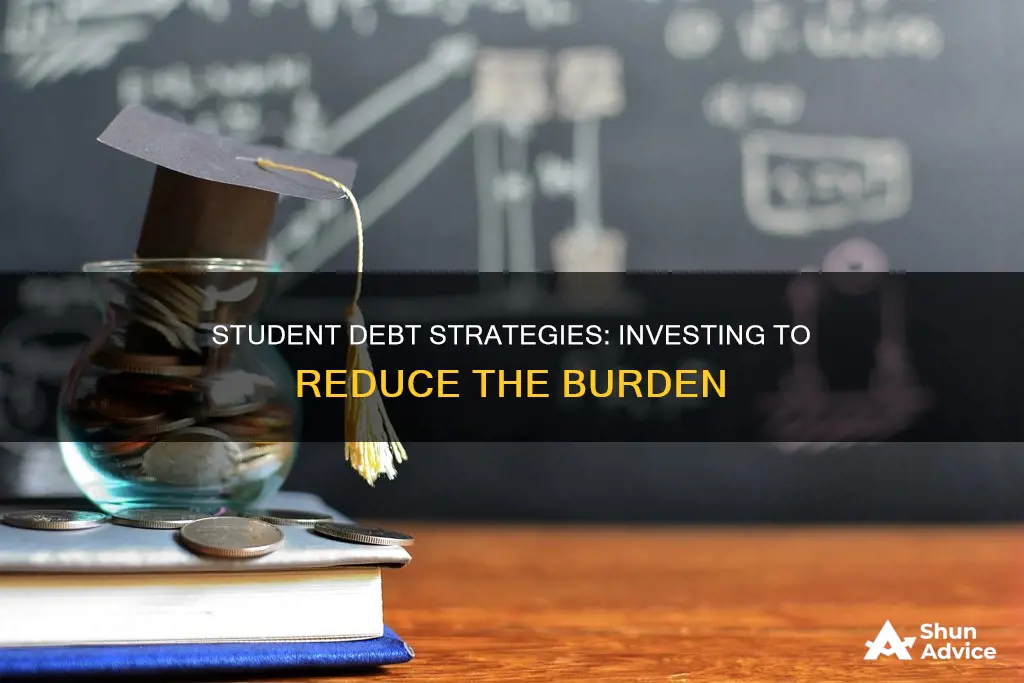
Whether you should invest or pay off your student loans first depends on your financial goals and how comfortable you are with debt. If you have high-interest student loans, especially private loans, you should prioritise paying them off. However, if you have a low-interest rate on your student loans, it may make more sense to put your money towards investing, as you will likely earn more from returns than you will save by paying off your loans faster.
If you can afford to, you may want to put portions of your discretionary income towards both investing and paying off your student debt.
| Characteristics | Values |
|---|---|
| When to pay off student loans | If you have high-interest rates, an unpredictable cash flow, or you’re looking to remove debt from your finances |
| Advantages of paying off student loans | Save money in interest, become debt-free sooner, improve debt-to-income ratio |
| Disadvantages of paying off student loans | May not be beneficial if working towards loan forgiveness or repayment assistance, miss out on building wealth |
| When to invest | If you are in a loan forgiveness program or have a low-interest rate |
| Advantages of investing | Possible better rate of return, retire sooner, flexible withdrawal rules |
| Disadvantages of investing | May struggle with monthly payments, won't improve debt-to-income ratio, investment risks |
What You'll Learn

Weighing the pros and cons of paying off student loans early
Pros of Paying Off Student Loans Early:
- Reduced Interest Charges: Student loans accrue interest over time, so paying them off early can result in significant savings. This is often the biggest benefit of early repayment.
- Faster Debt Freedom: Early repayment means getting rid of student debt faster and freeing up money for other expenses or financial goals.
- Improved Debt-to-Income Ratio: A lower debt-to-income ratio makes it easier to get approved for mortgages and other loans, and may lead to better interest rates.
- Peace of Mind: Clearing all your debt can provide immense relief and freedom from the stress of monthly payments.
Cons of Paying Off Student Loans Early:
- Loss of Tax Advantages: Interest paid on student loans is tax-deductible up to a certain amount annually. Early repayment means forfeiting this advantage.
- Impact on Emergency Funds: Paying off student loans early could drain your emergency savings, leaving you vulnerable to unexpected expenses.
- Higher Interest Rates on Future Loans: Student loans typically have lower interest rates than private loans. Paying off student loans early and then borrowing for other purposes could result in paying a much higher interest rate.
- Focus Shift from Other Financial Goals: Early repayment of student loans might shift the focus away from other important financial goals, such as retirement savings or building an emergency fund.
- Increased Monthly Payments: Paying off student loans early requires making additional or larger payments, which may be challenging for those with a low income or those early in their careers.
- Ineligibility for Student Loan Forgiveness: If you are eligible for student loan forgiveness programs, paying off your loans early might not be the best strategy as you would lose out on this benefit.
In conclusion, while there are benefits to paying off student loans early, it is important to carefully consider your financial situation and priorities before making a decision. Ensure that you are not compromising your emergency savings, retirement funds, or other financial goals in the rush to become debt-free.
Capacity Investment: Finding the Right Formula
You may want to see also

Pros and cons of investing
Pros of Investing
- If your expected rate of return is higher than your student loan’s interest rate, investing could be a better option.
- Investing can help you build wealth earlier and potentially retire earlier.
- You may be able to take advantage of an employer match with certain investment accounts.
- Investing can help you work on your financial security.
- You can invest and pay down student debt at the same time.
- Investing can help you grow your money over time.
Cons of Investing
- Returns might not always be sufficient.
- There's a risk of losing your principal investment.
- Investing won't help improve your debt-to-income ratio (DTI).
- All investments come with the risk of losing money.
Investment Influx: Output Demand Shift
You may want to see also

How to decide between paying off student loans and investing
The decision to pay off student loans or invest depends on your financial goals, priorities, and comfort with debt. Here are some factors to consider when deciding between the two:
Financial situation and goals
Start by evaluating your overall financial picture, including your cash flow, monthly budget, and other debts. If you have high-interest debt, such as credit card balances, it may be more beneficial to pay off that debt first. Also, consider your savings goals, such as building an emergency fund or saving for retirement.
Interest rates and potential returns
Compare the interest rates on your student loans with the potential returns on investments. If your student loan interest rates are high (above 10% APR), it is generally recommended to prioritize repayment. On the other hand, if you expect to earn higher returns on your investments than the interest rate on your student loans, investing may be a better option.
Type of student loans
The type of student loans you have, federal or private, can impact your decision. Federal loans typically have lower interest rates and offer benefits such as income-driven repayment plans, deferment, and loan forgiveness programs. Private student loans usually have different terms and fewer benefits, so tackling them first may be a priority.
Loan forgiveness and tax benefits
If you are enrolled in a student loan forgiveness program or qualify for tax benefits by paying student loan interest, investing may be a more attractive option. Loan forgiveness programs can reduce your overall debt burden, while tax benefits can help offset the cost of student loans.
Emotional and psychological factors
Carrying a significant amount of debt can cause emotional stress and affect your overall well-being. Becoming debt-free can provide peace of mind and relieve the burden of debt. On the other hand, investing early and consistently can help build wealth over time and potentially provide a higher return than paying off low-interest student loans.
Balancing repayment and investing
Remember that you don't necessarily have to choose one over the other. It is possible to balance both by making minimum payments on your student loans while also investing a portion of your income. This approach ensures that you are working towards both financial goals simultaneously.
Baseball Cards: Invest Wisely
You may want to see also

When to pay off student loans
Income and Financial Stability:
The first factor to consider is your current income and financial stability. If you have a stable income and can comfortably make the monthly loan payments, then you may want to focus on building an emergency fund and saving for retirement before paying off your student loans early. However, if your income is lower and you don't have any extra funds, sticking to the standard repayment plan is often the best option.
Interest Rates and Debt:
Another important consideration is the interest rate on your student loans compared to other forms of debt, such as credit cards or personal loans. Student loans generally have lower interest rates than many personal loans and credit cards. If you have high-interest debt, it's usually a good idea to prioritize paying that off first. Additionally, some student loans offer benefits like tax advantages or loan forgiveness programs, which can make it more advantageous to maintain those loans for a longer period.
Savings and Future Goals:
Building an emergency fund and saving for the future are crucial steps before accelerating your student loan payments. Life is unpredictable, and having a financial cushion can provide security and peace of mind. Additionally, if you're planning to buy a house or have other significant future expenses, allocating your funds towards those goals may be more beneficial than paying off your student loans early.
Loan Repayment Plans:
Understanding your student loan repayment plan is essential. Different countries and loan providers have varying repayment plans, grace periods, and thresholds for when repayments begin. Some plans have income-driven repayment options, where your monthly payment is tied to your income. It's important to know the specifics of your loan plan to make an informed decision about early repayment.
Pension and Retirement:
Saving for retirement is a critical aspect of financial planning. If your employer offers a retirement plan with matching contributions, it's generally advisable to prioritize that over paying off your student loans early. Contributing to a pension can provide tax benefits and help secure your financial future.
Seeking Professional Advice:
The decision to pay off student loans early depends on your unique financial circumstances. Speaking to a financial advisor can provide personalized guidance based on your income, debt, savings goals, and retirement plans. They can help you weigh the pros and cons of early repayment and ensure you're making a well-informed decision.
In summary, while it may be tempting to pay off student loans early, it's essential to carefully consider your financial situation and seek professional advice. Building an emergency fund, saving for retirement, and paying off high-interest debt are often prioritized over early student loan repayment. Ultimately, the decision depends on your specific circumstances, and finding the right balance for your financial goals is key.
Chipotle: A Smart Investment for Your Portfolio
You may want to see also

Tips for investing with student loans
- Refinance your loans: If your student loan payments are taking up a large chunk of your monthly budget, consider refinancing. Refinancing involves taking out a new loan at a lower interest rate, which can help you reduce your monthly payments and the overall interest owed. This can free up money for investments.
- Weigh interest rates against returns: If your student loans have a low interest rate (typically below 6%), investing your money may be more beneficial in the long term than paying off your debt faster. Compare the interest rates on your loans with potential investment returns to make an informed decision.
- Explore your options: Consult a financial advisor to get expert advice tailored to your specific financial situation, goals, and needs. They can help you balance investment opportunities while paying off your loans.
- Prioritize your financial goals: Before committing all your funds to paying off student loans or investing, consider other financial priorities such as building an emergency fund, paying off high-interest debt, or saving for necessary expenses.
- Compare interest rates and potential returns: When deciding between paying off student loans and investing, compare the interest rates on your loans with the potential returns on investments. If the expected rate of return on investments is higher than your student loan interest rate, investing may be a better option.
- Maximize tax benefits: Consider the tax benefits of both student loan interest deductions and retirement account contributions. Student loan interest payments may be tax-deductible, and contributing to a 401(k) or IRA can provide tax advantages.
- Do your research: Before investing, ensure you understand the risks and potential rewards associated with different investment options. Consult a financial advisor if needed to choose the best investment strategies for your goals.
Cardano: Invest Now or Miss Out?
You may want to see also
Frequently asked questions
It depends on your financial goals and priorities. If you want to become debt-free quickly, put your extra money towards removing student debt. If your expected rate of return is higher than your student loan’s interest rate or if you want to work on your financial security, investing could be a better option. You could also do both.
Paying off student loans early can bring peace of mind, in addition to reducing the amount of interest you pay over time. However, it could also mean missing out on building wealth by investing.
Investing has the potential for higher returns over time and can help you start building wealth immediately, with the possibility of retiring earlier. However, there is a risk of losing the principal when you invest, and returns might not always be sufficient.
You should consider your overall financial health, including what other kinds of debt you have, your total amount of student debt and interest rate, and your monthly student loan payment. You should also think about whether you can take advantage of any consumer protections, such as federal student loan forbearance or income-based repayment plans.







